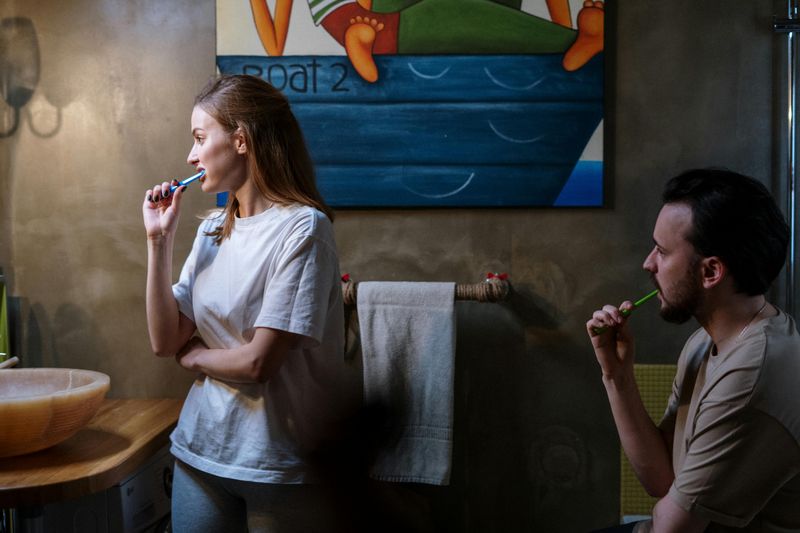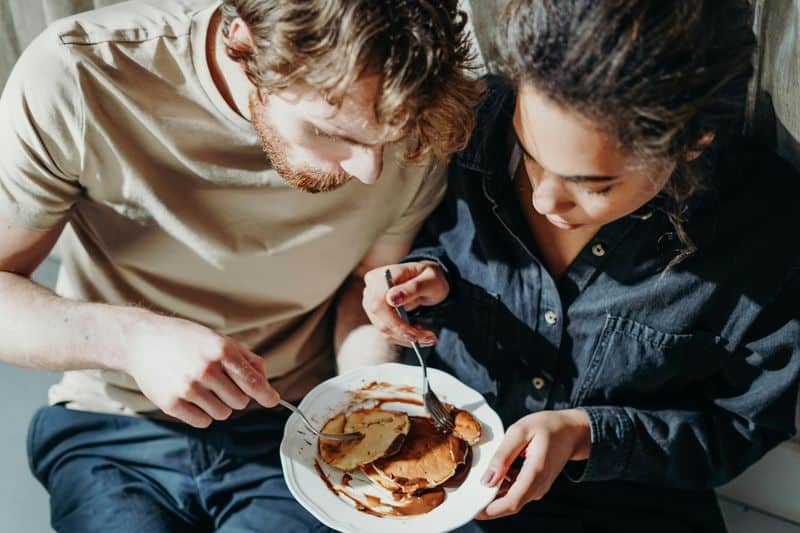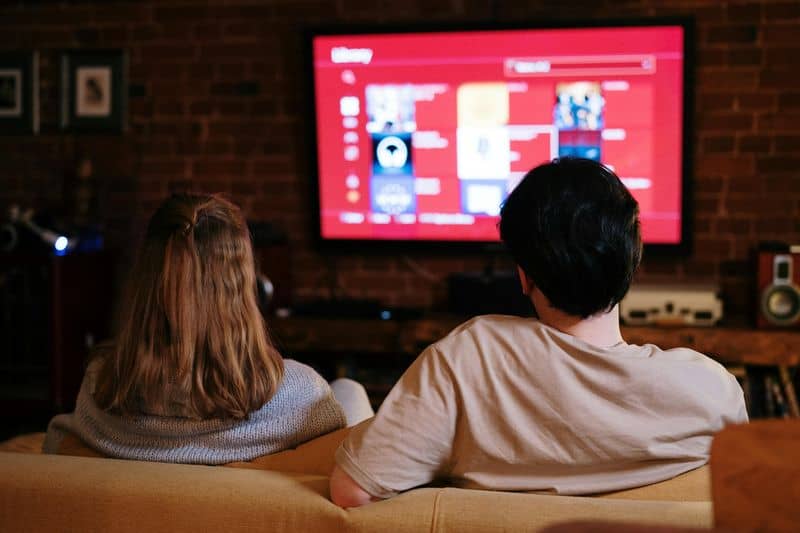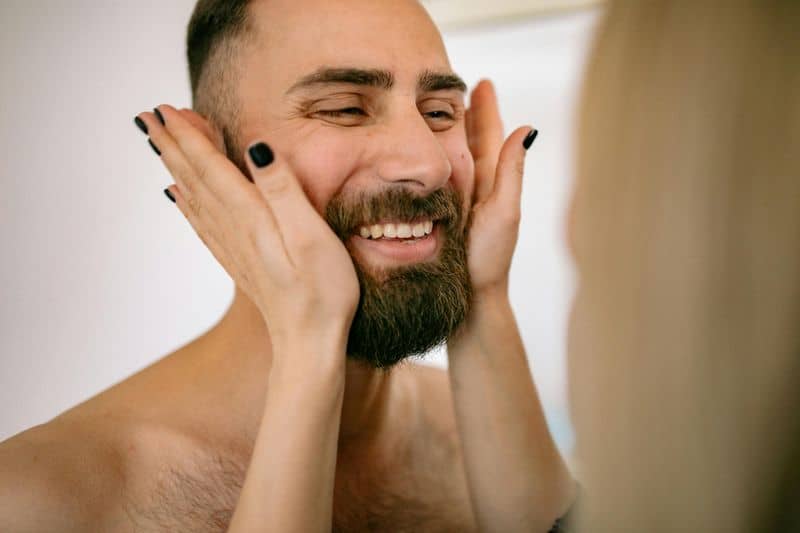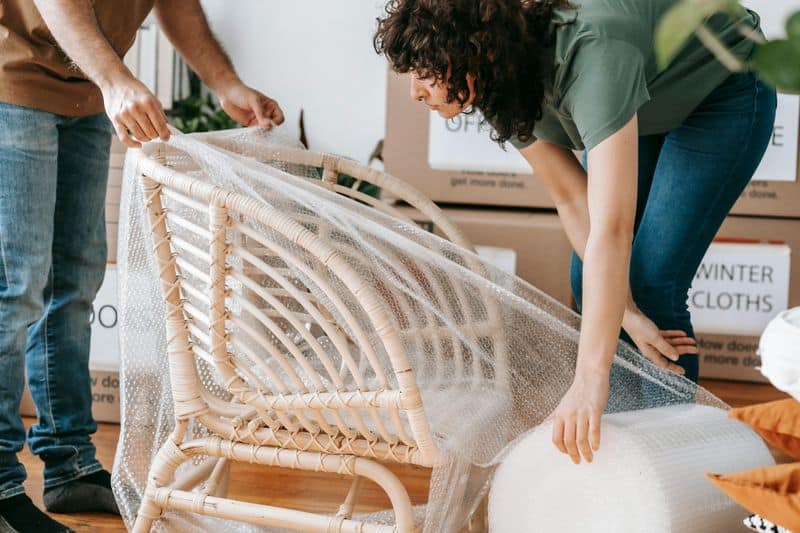When two people fall in love and spend time together, they slowly let their guard down. The awkward first-date jitters fade away, replaced by a cozy familiarity that only comes with time.
As relationships deepen, couples develop unique habits and behaviors that show just how comfortable they’ve become with each other.
1. Bathroom Door Stays Open
Remember when you’d rather burst than use the bathroom at your date’s house? Those days are gone! Comfortable couples pee with the door open, chat during showers, and even brush teeth together.
This bathroom freedom marks a major milestone in relationship comfort. What once seemed mortifying becomes perfectly normal as privacy barriers melt away. It’s not about being gross—it’s about feeling secure enough to be your complete self.
2. Sharing Food Without Asking
Forks dart across the table, stealing bites without permission. The “can I try some?” question becomes obsolete as plates essentially become communal property.
Comfortable couples develop an unspoken food-sharing agreement. That last bite of cheesecake? Fair game. Your partner’s french fries always taste better than yours anyway. Food stealing becomes such a normal part of dining that restaurants might as well provide one plate with two forks.
3. Netflix Debates Become Epic
The “what should we watch?” discussion transforms into a full-blown negotiation ritual. Comfortable couples spend more time scrolling through options than actually watching anything.
“We watched your pick last time” becomes a common refrain. The remote control might change hands multiple times during this sacred decision-making process. Eventually, they settle on something familiar—probably a show they’ve already seen three times—because choosing comfort over novelty is the hallmark of relationship security.
4. Discussing Bodily Functions
Gas, weird stomach noises, and bowel movements become legitimate conversation topics. “Guess what happened in the bathroom today?” stops being an alarming question.
Bodily functions, once carefully hidden, now merit detailed discussions and sometimes even proud announcements. Partners might track each other’s digestive health with surprising interest. This openness isn’t gross—it’s a sign of complete acceptance and trust.
No bodily function is too embarrassing when you’re truly comfortable with someone.
5. Appearance Standards Relax
The early-relationship habit of always looking perfect gradually fades. Ratty sweatpants, unwashed hair, and face masks become perfectly acceptable date night attire.
Women who once wouldn’t let their partner see them without makeup now wander around bare-faced. Men who used to suck in their stomachs exhale fully and let it all hang out. This comfort isn’t laziness—it’s the freedom to be authentically yourself without fear of judgment.
6. Developing Secret Language
Inside jokes multiply until couples practically speak their own dialect. A single raised eyebrow at a party can communicate an entire conversation about wanting to leave.
Random phrases take on special meaning: “Remember the raccoon incident?” might send both into fits of laughter while everyone else looks confused. Movie quotes, weird nicknames, and made-up words become relationship currency.
This unique language creates a private world that only the two of them fully understand—a verbal testament to their shared history.
7. Phone Boundaries Disappear
Password protection becomes meaningless as phones are freely shared. “Can you check that text while I’m driving?” leads to casual scrolling through each other’s messages.
Comfortable couples don’t think twice about grabbing their partner’s phone to take a photo or order takeout. The concept of digital privacy evolves from “don’t touch my phone” to “can you answer that for me?”
This isn’t about snooping—it’s mutual trust that eliminates the need for digital boundaries that once seemed so important.
8. Silence Becomes Comfortable
Early dating conversations were carefully crafted to avoid awkward silences. Now, couples can sit together for hours barely speaking—and it feels perfectly natural.
They’ve discovered the joy of companionable silence: reading books side by side, working on separate projects in the same room, or taking long drives with minimal chatter. The pressure to constantly entertain each other evaporates.
This comfortable quiet represents relationship security—knowing your connection doesn’t depend on filling every moment with words.
9. Grooming Each Other Like Primates
Plucking stray hairs, popping pimples, and examining weird moles becomes oddly satisfying. Comfortable couples engage in grooming rituals that would horrify outsiders.
“Is that an ingrown hair? Let me get it!” becomes an expression of affection rather than disgust. Partners might voluntarily clip each other’s toenails or examine mysterious bumps with genuine interest.
These intimate grooming moments—while admittedly strange—represent a primal level of closeness where nothing about the other person’s body is too gross or taboo.
10. Becoming Each Other’s Personal Assistants
“Can you grab my phone?” “Would you call the dentist for me?” These requests multiply as couples essentially outsource parts of their lives to each other.
Comfortable partners automatically refill empty water glasses, remember important appointments, and know exactly how the other takes their coffee. They become extensions of each other, anticipating needs before they’re expressed.
This mutual caretaking isn’t codependence—it’s the natural evolution of two lives becoming deeply intertwined, creating a system where each person makes the other’s day a little easier.


